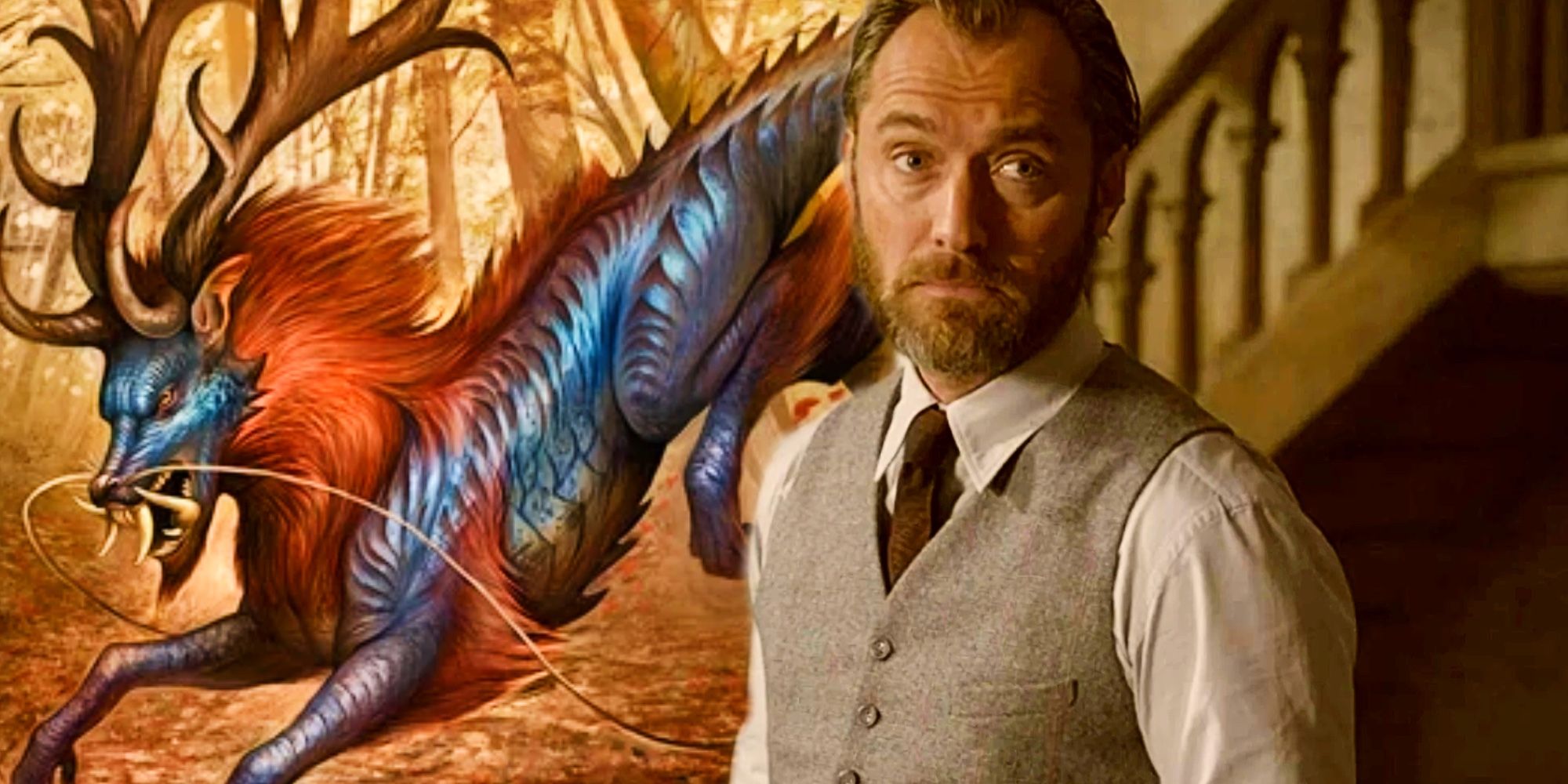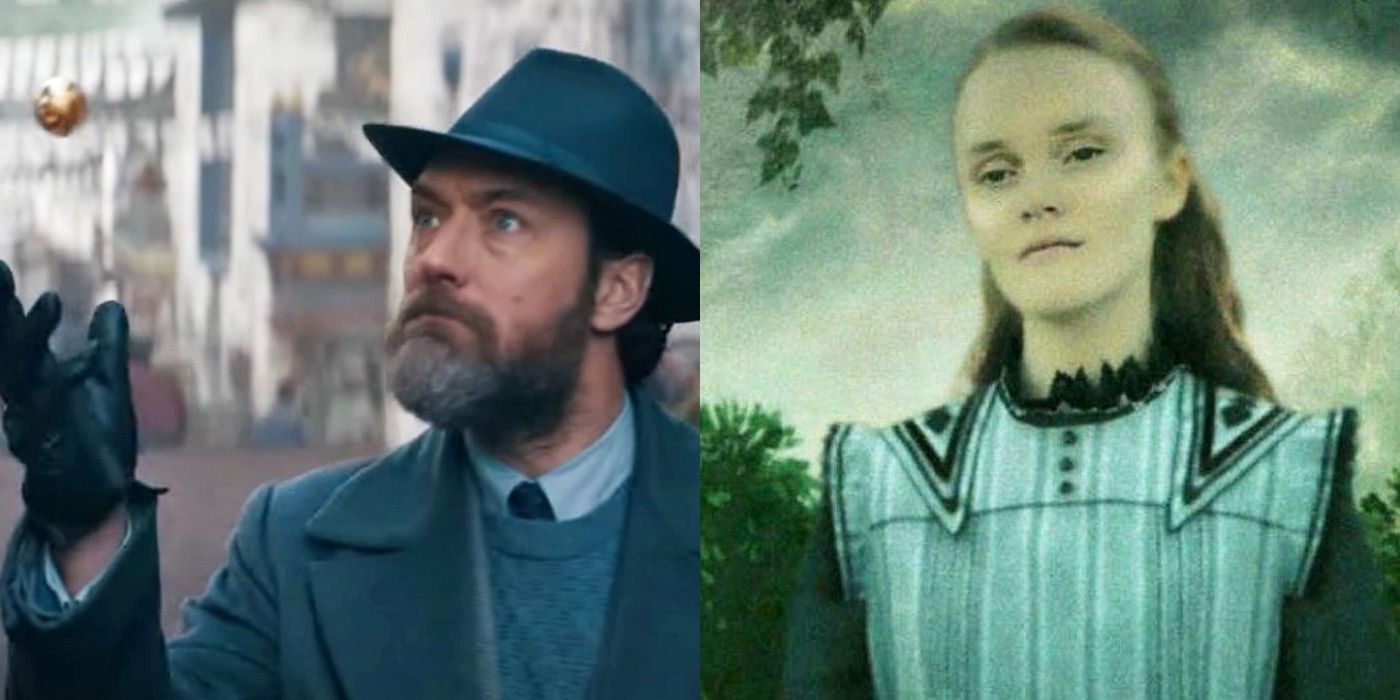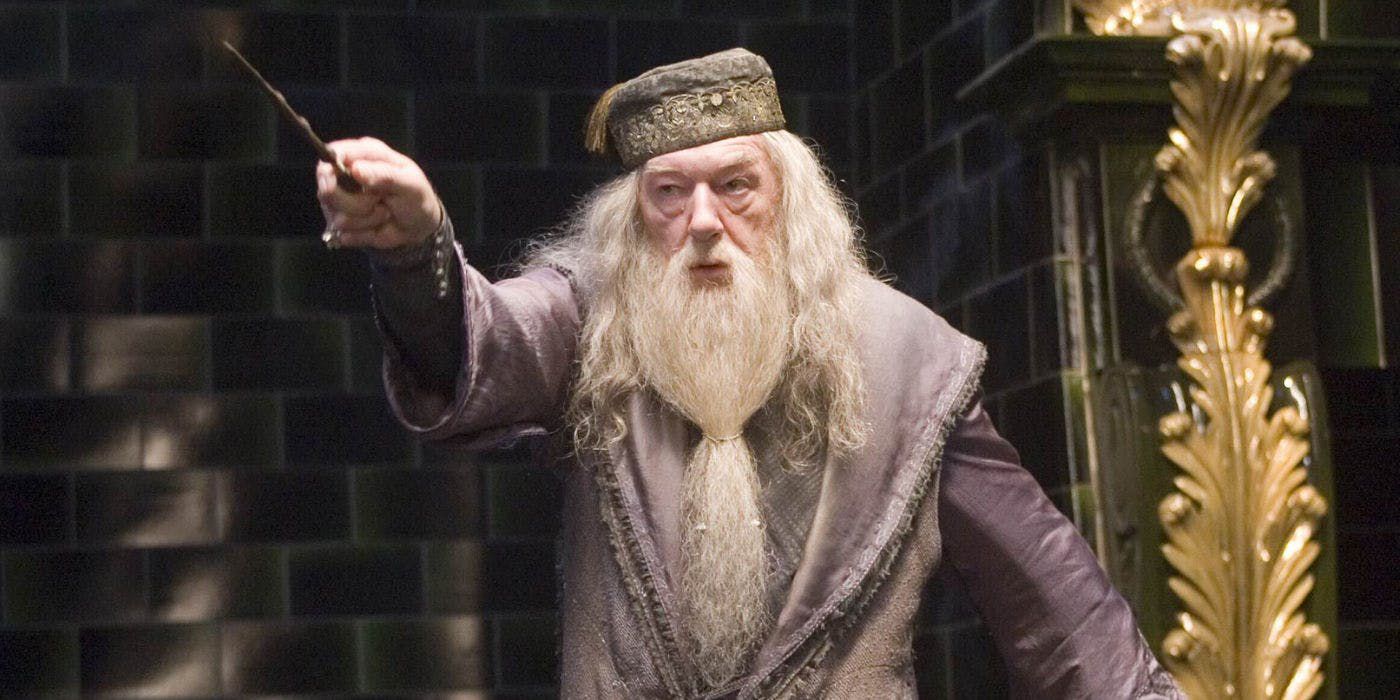One Harry Potter theory fixes a major Albus Dumbledore plot hole after Fantastic Beasts: The Secrets of Dumbledore. Albus Dumbledore was undoubtedly one of the greatest wizards of all time; a sorcerer of unparalleled strength and power who was famed for his final battle against the dark wizard Grindelwald and became the one sorcerer Voldemort feared. And yet, as powerful as he may have been, Dumbledore was certainly no moral paragon - in fact, he was noted for being extraordinarily manipulative.
Fantastic Beasts: The Secrets of Dumbledore introduced a mystical creature called a Qilin, a rare magical beast that can see into a witch or wizard's heart and soul. In the past, the Qilin has been trusted to choose the noblest leaders of the Wizarding World, and so at a time of crisis, the wizard community decided to trust in the judgment of a Qilin to decide their leader once again. In The Secrets of Dumbledore, The Qilin moved through the crowd and focused on Albus Dumbledore (Jude Law) himself, but Dumbledore was shaken to the core, unable and unwilling to accept the judgment of the qilin, and asked the beast to choose someone else.
While this major plot twist in Fantastic Beasts: The Secrets of Dumbledore seems particularly surprising, there is a strong Harry Potter theory that explains the Qilin's actions in the context of Dumbledore's backstory. In the Harry Potter canon, Dumbledore is fundamentally a deeply flawed man, yet the Qilin somehow saw nobility within his heart. Fortunately, there is a reason for the Qilin's left-field choice.
Dumbledore's Flaws Are Not As Great As He Believed
It's important to place Fantastic Beasts: The Secrets of Dumbledore in its proper context. The film is set in 1932, when Dumbledore was already well-known across the Wizarding World - but well before any of his greatest accomplishments in the Harry Potter canon. Dumbledore is haunted by what he sees as past mistakes; as a teenager, he met and fell in love with Gellert Grindelwald, failing to see how dangerous the man could be. The two became obsessed with the Deathly Hallows, with Dumbledore coming to share Grindelwald's beliefs in what he later came to consider the folly of youth. So committed were the two to one another that they even created a Blood Pact so that neither could ever move against the other. Matters came to a tragic conclusion when Albus' brother Aberforth confronted him one fateful night, leading to a magical duel in which their sister Ariana Dumbledore was killed. Albus would always blame himself, and he is characterized by a deep self-hatred for his past mistakes.
Yet the Fantastic Beasts films have subtly suggested Dumbledore's self-hatred is unjustified. Throughout the trilogy, Grindelwald (Mads Mikkelsen) is obsessed with Obscurials, beings of unprecedented magical power. Therefore, it seems highly suspicious that the Dumbledore family appears to be unusually prone to developing Obscurials, given that Ariana was one, and so was Albus Dumbledore's nephew Credence. This suggests Grindelwald had his own agenda when he entered Albus' world and that he manipulated Dumbledore to achieve his own ends. It feels more as though Grindelwald groomed the young and impressionable Dumbledore, a theory reinforced by the fact they created a Blood Pact. This is far too convenient, suggesting Grindelwald knew Dumbledore's enthusiasm for their shared vision would fade, and he secured himself against a future where such a powerful wizard would be free to oppose him.
This recasts Dumbledore's story in quite a dark way, suggesting there is a sense in which he should really be seen as one of Grindelwald's first victims. When the Qilin peers into Dumbledore's heart, it sees all of this; the burning regret and shame, the pain and lingering heartbreak. Knowing these things, it attempts to give Dumbledore a gift by acknowledging the goodness that lies within him that led to him abandoning Grindelwald's dark philosophy and striving to oppose his former lover despite their tragic Blood Pact.
The Qilin Offered Dumbledore A Choice
If this theory holds, then there is a sense in which the Qilin was offering Dumbledore a choice. He could accept the Qilin's judgment and, in so doing, allow it to reframe his very sense of self-identity. Transformed by the qilin, he would have become the leader of the Wizarding World at a crucial time in history when it really needed a champion to lead it. Tragically, Dumbledore could not accept this, as he was too aware of the mistake of the past, and his self-hatred was too deep. As revealed in Harry Potter & the Deathly Hallows Part II, Dumbledore never forgot his youth, obsession with Grindelwald, and the Deathly Hallows. He always blamed himself for Ariana's death, as he admitted to Harry Potter (Daniel Radcliffe) in a mystical experience, stating: "I had proven, as a very young man, that power was my weakness and my temptation." In this way, Dumbledore could never trust himself, despite the Qilin's prescient judgment in The Secrets of Dumbledore.
As a result, Dumbledore chose a different life, rejecting the path the Qilin offered him. He remained at Hogwarts and, in truth, still became one of the greatest champions of the Wizarding World. He defeated Grindelwald, claimed and kept the dangerously powerful Elder Wand, and led a group he called the Order of the Phoenix in the battle against Voldemort. But there is a sense in which he never truly lived, with the final scenes of Fantastic Beasts: The Secrets of Dumbledore serving as symbolic of all Albus Dumbledore's relationships; he engineered success for others, watched it play out from afar, and quietly slipped away without sharing in the joy and celebration. During the Fantastic Beasts films, the existence of the Blood Pact forced Dumbledore to act in the shadows, manipulating events subtly lest the Blood Pact kill him. As a result, these became his habits, and by the time he taught Harry Potter, he was a skilled manipulator.
If this theory is correct, then the Qilin's judgment is no plot hole at all, and rather than sense nobility, as the wizards believed, it senses the potential for nobility. This is a far more powerful message, as it means a person does not need to be defined by the mistakes of their past - but, tragically, it also means a person can choose to be defined by them. Perhaps this is the greatest secret in Fantastic Beasts: The Secrets of Dumbledore - that Albus Dumbledore could have lived a very different life but did not believe he deserved to do so.



